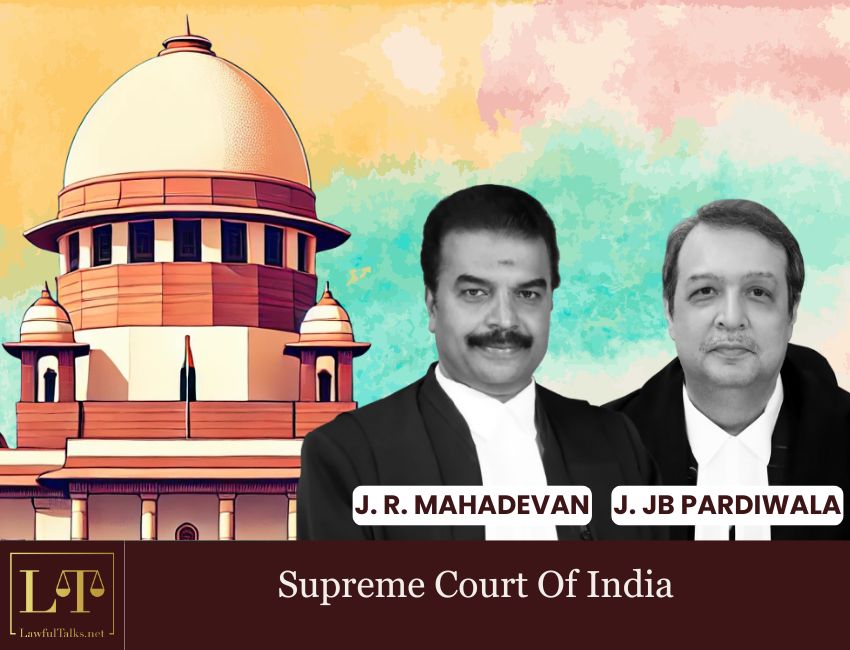Allahabad HC Sets Aside Afzal Ansari's Conviction, Allows Him to Continue as MP

The Supreme Court recently reaffirmed that writ courts should not interfere in cases involving mere violations of statutory provisions or norms unless such violations result in injustice. The Division Bench of Justice J.B. Pardiwala and Justice R. Mahadevan, emphasized that the High Court’s power under Article 226 is discretionary. Therefore, even if an order is legally invalid, the High Court can choose not to intervene if doing so serves the interest of substantial justice between the parties.

The dispute arose when M/s. Arihant Sarees, a borrower of Indian Bank, defaulted on its loan. In accordance with the SARFAESI Act, the bank auctioned the mortgaged property on 31th July, 2007, and M.S. Sanjay emerged as the highest bidder. He paid the full auction amount of Rs. 24,00,000 and was issued a sale certificate on 30th November, 2007. Neither the borrower nor the guarantor objected at the time. However, in March 2008, the guarantor (Respondent No.4) challenged the auction before the Debt Recovery Tribunal (DRT), alleging non-compliance with statutory notice requirements.
The DRT ruled in favor of the guarantor, citing procedural lapses in the issuance of the auction notice. This decision was later overturned by the Debt Recovery Appellate Tribunal (DRAT), which upheld the validity of the sale. The DRAT observed that the bank had followed due process and that the guarantor had remained silent until the property was sold. However, the Karnataka High Court, upon a writ petition filed by the guarantor, reversed the DRAT’s decision, holding that the bank had failed to provide a 30-day clear notice before the auction, as required under the SARFAESI Act in 2007.
After due consideration of facts and submissions before it the Supreme Court observed that the guarantor had remained silent during the auction process and only raised objections months later, indicating an attempt to challenge a legitimate sale on a technical ground. The appellant had legally acquired the property, followed due process, and made significant investments in its development.
The Court criticized the Karnataka High Court’s approach, stating that “it went strictly by the number of days necessary for the issuance of auction notice” while failing to consider the practical realities of the case.
"The High Court should have taken a practical view of the matter considering that the auction had attained finality way back in the year 2007," remarked the bench.
Additionally, the Supreme Court emphasized that legal formalities should not be enforced in isolation, as doing so may cause undue hardship. The appellant had obtained approvals and invested Rs. 1.5 crore in the property after purchase.
"Legal formulations cannot be enforced divorced from the realities of the fact situation of the case. While administering law, it is to be tempered with equity." the Court observed.
The judgment reaffirmed that judicial discretion under Article 226 should be exercised carefully and writ jurisdiction should not be used to disturb settled transactions based on mere technical infractions. The Court relied on precedents, particularly Shiv Shanker Dal Mills v. State of Haryana (1980) 2 SCC 437, stating:
"Article 226 grants an extraordinary remedy, which is essentially discretionary, although founded on legal injury. It is perfectly open for the Court, exercising this flexible power, to pass such orders as public interest dictates and equity projects."
The Court further held that even if an administrative lapse occurred, it did not cause injustice and, therefore, did not warrant the cancellation of a legitimate auction sale.
In conclusion, the Supreme Court set aside the Karnataka High Court’s ruling and reinstated the DRAT’s decision, thereby upholding the validity of the auction sale. The Court found the guarantor’s challenge to be frivolous and observed that it had "dragged the appellant into unnecessary litigation". While it considered imposing costs on the guarantor, it ultimately refrained from doing so.
"At one point of time, we were inclined to allow this appeal with costs to be paid by the Respondent No.4 for instituting a frivolous litigation. However, we have refrained ourselves from passing any order of costs, " stated the court.
Case Details: M.S. Sanjay v. Indian Bank & Ors., Civil Appeal No.1188 of 2025
Advocate for the Petitioner: Anuradha Mutatkar
Advocate for the Respondent: Himanshu Munshi [R-1], Dinesh Kumar Garg [R-4]

Anushka Bandekar
Advocate
Latest Posts
Categories
- International News 19 Posts
- Supreme Court 352 Posts
- High Courts 367 Posts





























































































































































































































































































































































































































































































































































































































































































































































